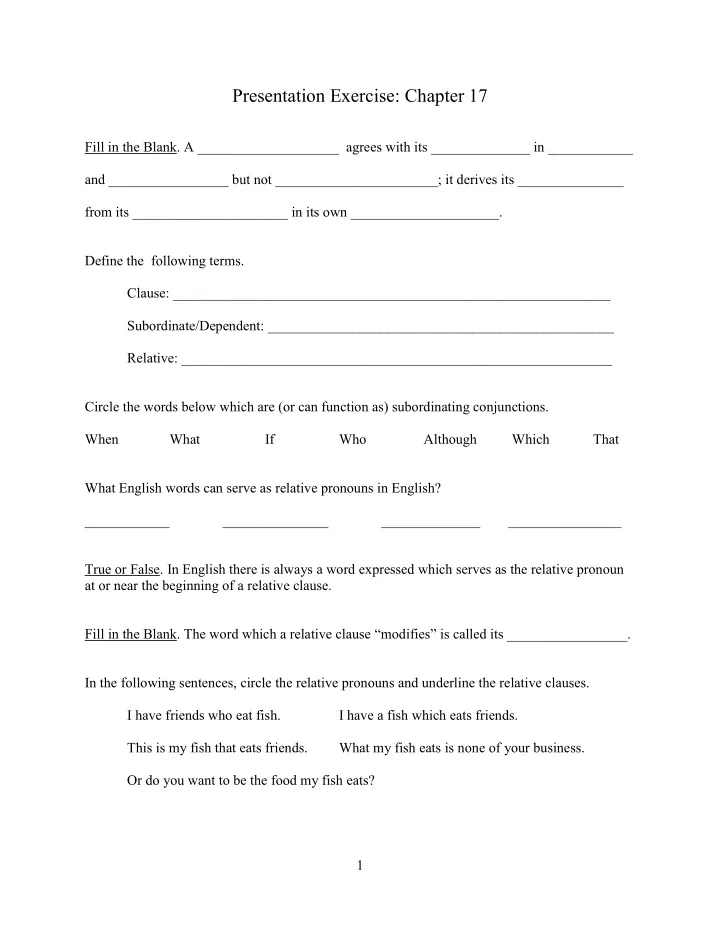

Presentation Exercise: Chapter 17 Fill in the Blank. A ____________________ agrees with its ______________ in ____________ and _________________ but not _______________________; it derives its _______________ from its ______________________ in its own _____________________. Define the following terms. Clause: ______________________________________________________________ Subordinate/Dependent: _________________________________________________ Relative: _____________________________________________________________ Circle the words below which are (or can function as) subordinating conjunctions. When What If Who Although Which That What English words can serve as relative pronouns in English? ____________ _______________ ______________ ________________ True or False. In English there is always a word expressed which serves as the relative pronoun at or near the beginning of a relative clause. Fill in the Blank. The word which a relative clause “ modifies ” is called its _________________. In the following sentences, circle the relative pronouns and underline the relative clauses. I have friends who eat fish. I have a fish which eats friends. This is my fish that eats friends. What my fish eats is none of your business. Or do you want to be the food my fish eats? 1
True or False. A relative clause can stand alone and make sense; it does not have to be embedded inside a larger sentence or thought. What does the ante - in “ antecedent ” mean literally? __________________ What does the - ced - in “ antecedent ” mean literally? __________________ Underline the pronouns in the following sentences and circle the correct term for each pronoun (interrogative or relative). What are you doing? INTERROGATIVE or RELATIVE What you're doing is wrong. INTERROGATIVE or RELATIVE True or False. Interrogative pronouns introduce independent sentences. Fill in the chart below with the proper forms of the relative pronoun in Latin. SINGULAR * PLURAL M F N * M F N * Nom _________ _________ _________ * _________ _________ _________ * Gen _________ _________ _________ * _________ _________ _________ * Dat _________ _________ _________ * _________ _________ _________ * Acc _________ _________ _________ * _________ _________ _________ * Abl _________ _________ _________ * _________ _________ _________ In the chart above, do the following: 1) put a circle around the forms which have first/second-declension endings; 2) put a box around the forms which have third-declension endings; 3) put a check next to the forms which have pronoun endings. How many forms are left and what are they? _________________________________________ True or False. English does not make a distinction between the singular and plural forms of the relative pronoun. 2
Fill in the Blank. Supply the proper form ( “ Whose ” or “Who’s” ) in the sentences below. _____________ car is that? ________________ on first base? Circle the cases below where English does or can use “whom” (alone or with a preposition) to translate the Latin relative pronoun. Nominative Genitive Dative Accusative Ablative True or False. English “ which ” is never used to translate a masculine or feminine Latin relative pronoun. Multiple Choice. The case of a relative pronoun is determined by a. the case of its antecedent c. its use in its own clause b. apposition d. good guessing Sentence Grammar. “ Cops finally capture student who murdered Latin teacher. ” Circle the relative pronoun in the sentence above, and underline the relative clause. If this sentence were in Latin, … … what case would the antecedent “ student ” be in? ______________________________ … what number and gender would the ant ecedent “student” be? ____________________ … what case would the relative pronoun be in? _________________________________ … give the proper Latin form of the relative pronoun which would be used here. _______ In each of the sentences on the following page: 1) circle the relative pronoun; 2) underline its antecedent; 3) give the number and gender of the antecedent; 4) give the case of the relative pronoun (as determined by its use in its own clause); 5) give the correct form of the Latin relative pronoun for that sentence. 3
1. Amo puellam quae ex Itali ā venit. ( “ I love the girl who came from Italy. ” ) Number/Gender of Antecedent: ______________ Case of Relative Pronoun: ______________ Proper Form of the Relative Pronoun: ______________________________________________ 2. Homo de quo dicebas est stultus. ( “ The man about whom you were speaking is stupid. ” ) Number/Gender of Antecedent: ______________ Case of Relative Pronoun: ______________ Proper Form of the Relative Pronoun: ______________________________________________ 3. Puella cui librum dat est bella. ( “ The girl to whom he is giving the book is pretty. ” ) Number/Gender of Antecedent: ______________ Case of Relative Pronoun: ______________ Proper Form of the Relative Pronoun: ______________________________________________ 4. Puer cuius patrem iuvabamus est miser. ( “ The boy whose father we used to help is unfortunate. ” ) Number/Gender of Antecedent: ______________ Case of Relative Pronoun: ______________ Proper Form of the Relative Pronoun: ______________________________________________ 5. Vitam meam committam eis viris quorum virtutes laudabas. ( “ I will entrust my life to those men whose virtues you used to praise. ”) Number/Gender of Antecedent: ______________ Case of Relative Pronoun: ______________ Proper Form of the Relative Pronoun: ______________________________________________ 6. Timeo periculum quod timetis. (“ I fear the danger which y'all fear. ”) Number/Gender of Antecedent: ______________ Case of Relative Pronoun: ______________ Proper Form of the Relative Pronoun: ______________________________________________ 4
VOCABULARY Complete the information about the vocabulary items discussed in the presentation. For CATEGORY give the declension (adjectives), declension/gender (nouns), conjugation (verbs) or part of speech (others) . For OTHER INFORMATION, include elements such as the word’s base. WORD CATEGORY MEANING/S OTHER INFORMATION AMICITIA: ____________ ________________________ ________________________ VERITAS: ____________ ________________________ ________________________ QUI: ____________ ________________________ ________________________ AUT: ____________ ________________________ ________________________ NIMIS: ____________ ________________________ ________________________ COEPI: ____________ ________________________ ________________________ INCIPIO: ____________ ________________________ ________________________ DELEO: ____________ ________________________ ________________________ NEGLEGO: ____________ ________________________ ________________________ FACTUM: ____________ ________________________ ________________________ 5
Recommend
More recommend